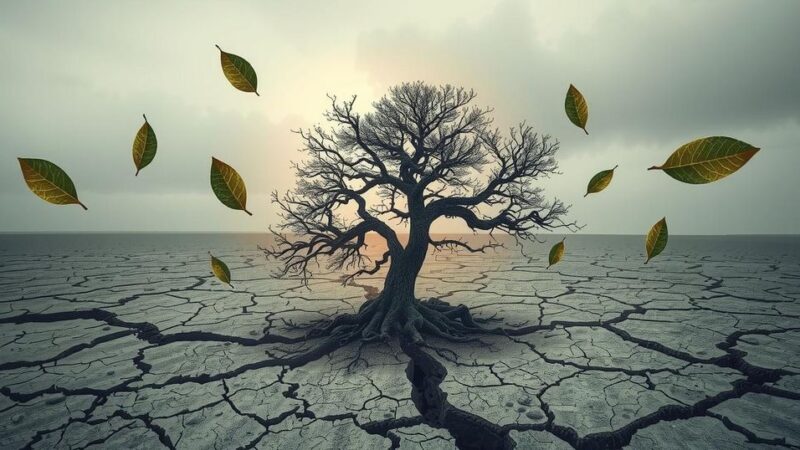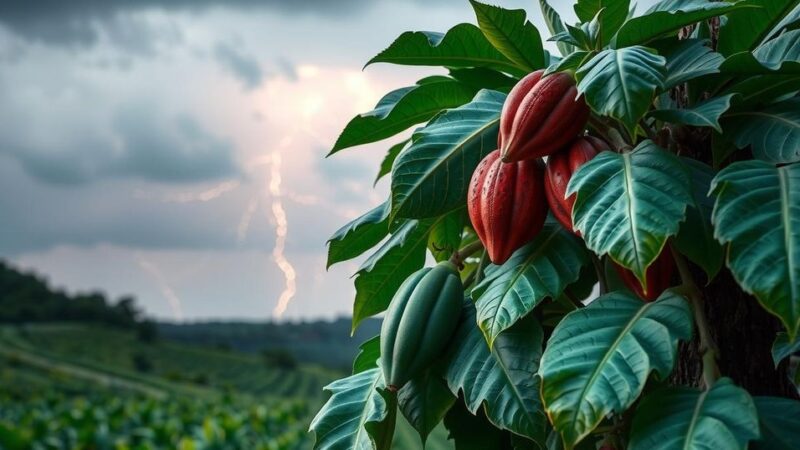Climate change is jeopardizing the traditional gift of chocolates for Valentine’s Day, as reported by Christian Aid. Erratic weather and rising temperatures have drastically affected cocoa production in key countries, leading to a 400% increase in prices. Urgent action is needed to support cocoa farmers and reduce harmful emissions to safeguard this vital industry.
Climate change poses a serious threat to the traditional Valentine’s Day gift of chocolates, as highlighted by a report from Christian Aid. Erratic weather patterns and rising temperatures in major cocoa-producing countries have led to increasing global prices and uncertain futures for farmers. The report indicates that cocoa prices surged by 400% due to droughts, floods, and climate-related diseases impacting production in 2023, resulting in less availability for chocolate manufacturers.
These adverse conditions particularly affect Ghana and Ivory Coast, where over half of the world’s cocoa is cultivated. Heavy rains during Ghana’s dry season resulted in plant rot while subsequent droughts severely diminished crop yields. The UN reported that this drought, which impacted over one million people, was significantly exacerbated by climate change, highlighting its devastating influence on agriculture in the region.
In conjunction with these findings, a study from Climate Central has observed that the West African “cocoa belt,” which spans several countries, is experiencing increased temperatures due to climate change. Data indicates that cocoa-growing regions have experienced at least three additional weeks annually of days above 32°C. In 2024, an even greater increase was recorded, adversely affecting crop quality and yield.
Moreover, cocoa agriculture is facing challenges globally, as demonstrated by the issues faced by farmers like Amelia Pop Chocoj in Guatemala. She reported that her cocoa trees, typically hardy, are withering due to water shortages, resulting in a lack of food for her family. She expressed her concerns about the immediacy of climate-related crop losses, stating, “I’m actually not worried that it ‘may’ happen, it’s happening already.”
Christian Aid has called for urgent measures to reduce emissions from fossil fuels and other contributing sources to mitigate rising temperatures. The organization also advocates for targeted financial assistance to help cocoa farmers adapt to the changing climate. In the UK, chocolatiers are voicing concerns about how these climatic changes, compounded by global weather phenomena, threaten small businesses in the chocolate industry.
Andy Soden from Kernow Chocolate remarked on the increasing wholesale costs of chocolate, suggesting that the negative effects of climate change have been universally felt within the industry. He articulated the industry’s challenges, stating, “It’s a nightmare. I don’t think any business involved in chocolate has avoided this impact, and it’s all down to climate change.”
Osai Ojigho, Christian Aid’s director of policy and public campaigns, emphasized the critical need for emission reduction and dedicated climate finance for cocoa growers to ensure the livelihood of those dependent on cocoa. She stressed the urgent need for action to safeguard this essential crop and its associated communities.
In summary, climate change represents a significant threat not only to cocoa production but also to the livelihood of farmers who depend on this crop. Rising global temperatures and erratic weather patterns have led to soaring cocoa prices and crop shortages. Urgent action is required to address emissions and support cocoa farmers in adapting to these adverse climate impacts. The stability of the chocolate industry, particularly for small manufacturers, is also at risk due to these ongoing environmental changes.
Original Source: www.perspectivemedia.com






